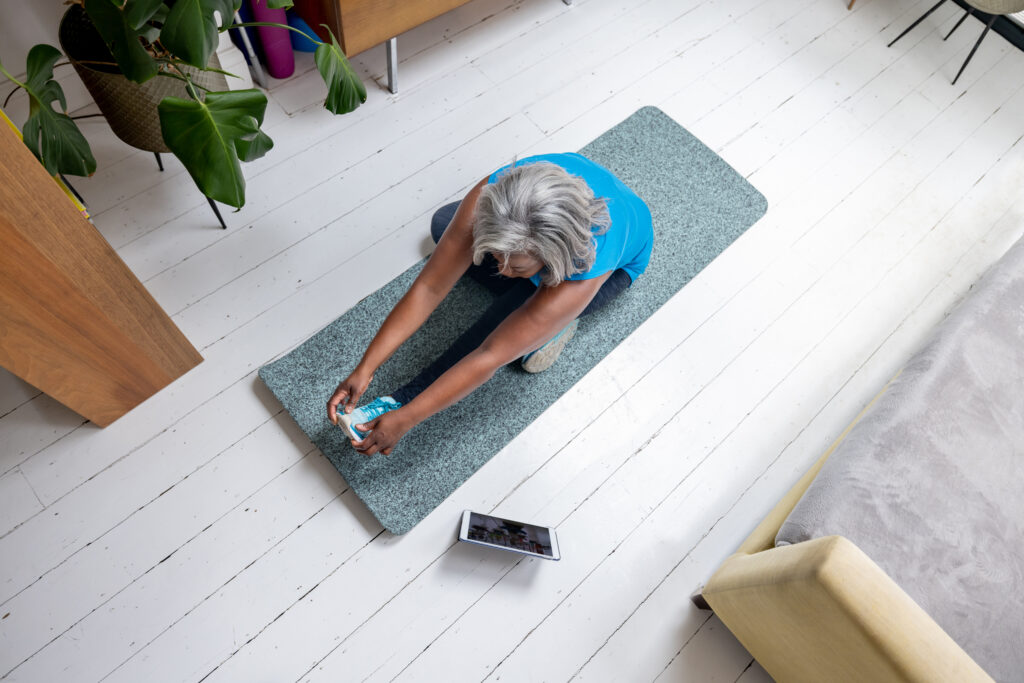HEALTH & WELLNESS IN THE 4TH QUARTER OF LIFE

How do you define health? Particularly in the context of normal aging, health is a subjective term. At 21, you may have been perfectly able to raise hell with the best of them on Saturday night, and still be fresh as a daisy for an early service Sunday morning. With the passage of time, many things change. Our youth-obsessed culture tells us that these changes, like a flash of silver in our hair, a sudden tenderness in the soles of our feet (it’s a fact: the fat-pad on the bottoms of our feet thin with age), or a new inability to comfortably digest spicy foods we once loved, are inherently bad. We know otherwise. These changes are simply our new reality.
Health in mid-life and beyond begins with attitude. A large part of claiming and creating a healthy life is identifying what’s important to you right now. In spite of the protests of your grown children, you may want to trade the big family house in the suburbs for a cool city loft close to culture, or a breezy beach pad far away from everything where you can just leave footprints in the sand and enjoy a silent sunset, all to yourself. These choices and decisions are as varied as the women who make them, but start by recognizing that this present moment belongs to you. It took a long time to get here – 50, 60, 70 trips around the sun – and you deserve to do what suits you. Finally.
The second great epiphany about health in the later decades of life is that you must become an advocate for yourself. If you have been blessed with good health until this point, thank your ancestors. And if you’ve avoided obvious health pitfalls like smoking, give yourself a well-deserved pat on the back, too.


But the fact is, most of us will begin to encounter more health issues in our sixth and seventh decades of life than we did when we were young. Don’t blame yourself. Lifestyle plays a role, but other key factors in the longevity and wellness of Black women include inherited traits, including generational trauma. Paired with the psychological and physical effects of the microaggressions that Black people experience daily, it’s no surprise that hypertension and heart disease disproportionately shorten the lives of Black Americans. In fact, emerging data reflects the alarming fact that these conditions impact Black people earlier and earlier in life.
In mid-life and beyond, Black women are more prone than other women to hypertension, diabetes, osteoarthritis, risk for depression, and cardio-metabolic diseases. The reasons may seem elusive, especially if you’ve been fortunate enough to receive informed and compassionate medical care earlier in life. Maybe your experiences with conventional doctors have made you feel invisible, not seen, not heard, not listened to. Mistrust in the medical system, as well as lack of access to high-quality, culturally appropriate care, also contribute to poor health among Black women.
All of this leads to only one conclusion: we must speak up when we show up. When you’re scheduled for a doctor’s visit, whether online or in the office, prepare questions in advance. Type them, print them out, and hand them (or email them) to your practitioner to address and keep on file. If at all possible, bring a loved one, because they can catch and hear things that you might miss. If you don’t get satisfactory answers, change doctors.
When you’re being prescribed a new drug, ask why. Ask about side-effects. Take notes. When a prescribed protocol hasn’t changed your outcome– your health, the way you feel — ask why. Express your dissatisfaction and ask for alternatives. You’re allowed to do this. You’re allowed to be seen, heard, and to take up space. And you’re allowed to fire your Primary Care Physician, specialist, dentist, etc.!

Simply put, we all must advocate for ourselves to the degree possible, and enlist the expertise of others to advocate for us when it all just seems like a bridge too far.. This is true for everyone, especially for women, and most especially for Black women. This advocacy is an essential part of Black women laying claim to true agency, the power to determine our own lives, quality of life, and outcomes.
We operate from the premise that today is the first day of the rest of our lives. We’re dedicated to bringing you enlightening and empowering knowledge from every corner of the wellness universe. We’re also dedicated to the belief that the later decades of life can be a time of tremendous rewards. Help us prove it! Because you deserve to experience these rewards in radiant good health, at every age, and in every moment.
Be the first to comment